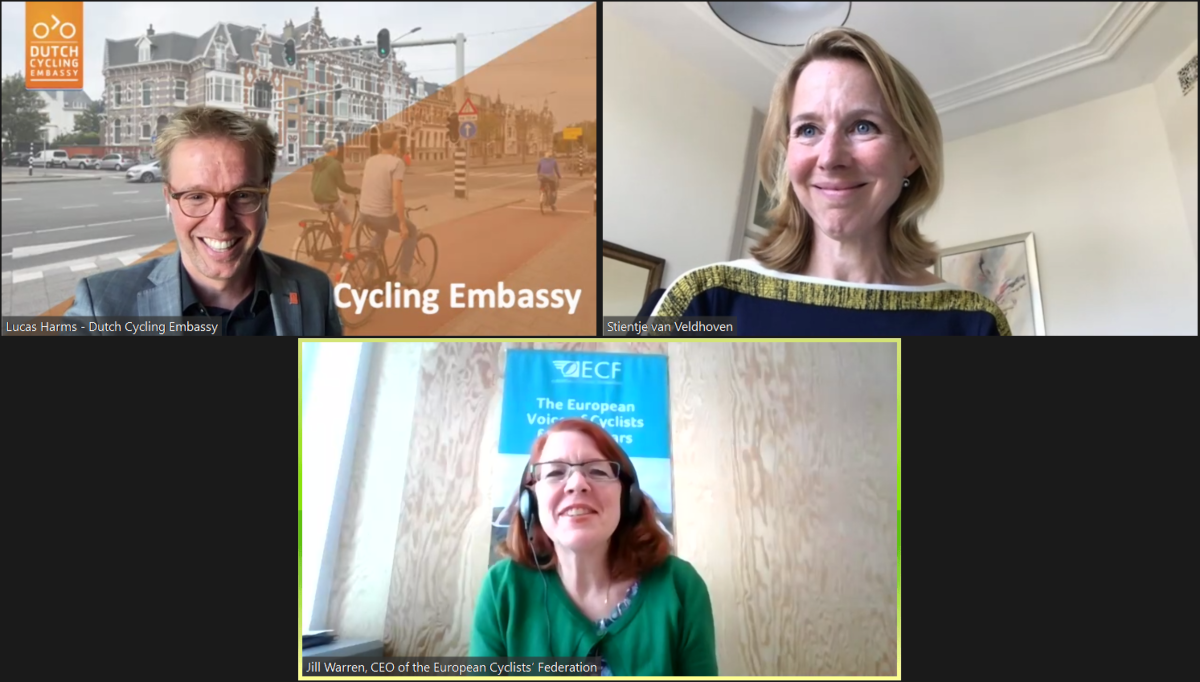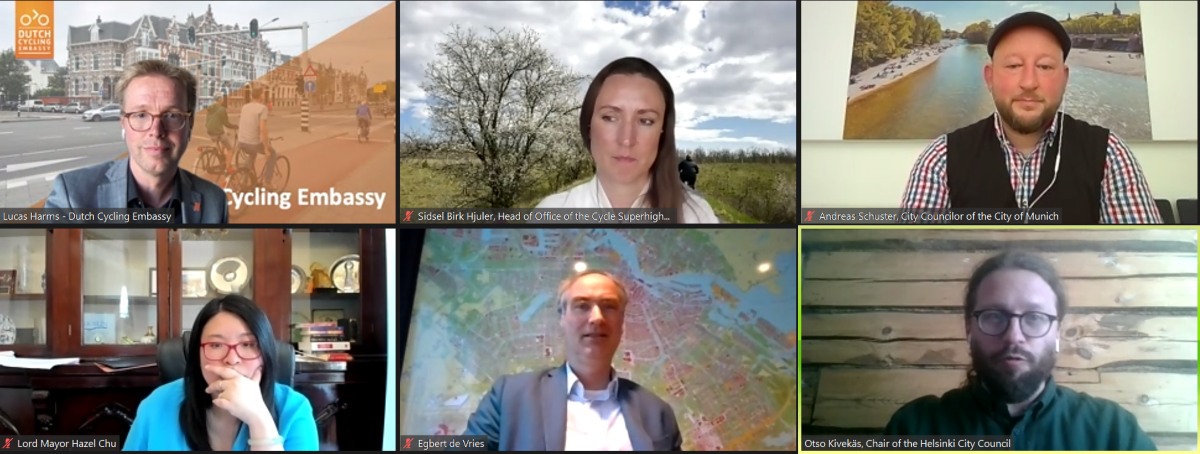
“The bike is our secret weapon”: European cycling cities and EU institutions meet to share best practices
Over 1,300 participants were registered when politicians and officials from European cities, EU institutions and the Netherlands met for an event on the role of cycling and cities in shaping better mobility systems and tackling the climate crisis.
High-level speakers from all over Europe met on 1 June 2021 to share best practices for how to shape more cycle-friendly urban mobility systems. “Celebrating Cycling Cities: Sharing Europe’s Best Practices”, an online event co-hosted by the European Cyclists’ Federation (ECF) and the Dutch Cycling Embassy (DCE), formed a part of the official EU Green Week 2021 programme and featured a packed line-up of city cycling experts, officials and politicians from all over Europe.
For the event’s first keynote, Daniel Mes, Member of Cabinet of European Commission’s Executive Vice-President Frans Timmermans, noted that despite the great strides being made at the EU level that “a lot of action will still need to take place locally and that is why this event is so crucial with cities coming together to share their success stories.”
Matthew Baldwin, Deputy Director-General of DG MOVE and Mission Manager of “100 Climate-Neutral Cities by 2030”, followed up this message by underlining the role cycling had to play in achieving climate neutrality. He also encouraged city officials to apply for EU recovery funds for cycling and to apply pressure on national and regional governments to implement more cycle-centric policies.
This celebration of cycling cities was a packed event with speakers from across the continent sharing their stories of best practices. Dutch State Secretary for Infrastructure and Water Management Stientje van Veldhoven spoke from experience when describing the collaborative efforts that crucially underpin the successful development of cycling infrastructure.
Stientje emphasised that the number of cyclists in a city will grow, provided that mobility networks are combined with high-quality infrastructure and policy that takes cycling seriously. She explained, “The bike is our secret weapon against so many of the problems we are facing”, and that the Dutch willingness to share these lessons is matched by a desire to learn from advances being made elsewhere on the continent.
Highlighting Europe’s best practices
The ensuing round table discussions exemplified the incredible breadth and depth of the progress being made in implementing more cycling across the continent. From the success of hybrid-bike share systems in Dublin, to the benefits of youth focused cycling schemes in Gdansk, and detailed economic analysis of the economic benefits of more cycling in Helsinki that is helping to inform public officials in their decision-making, the roundtable lived up to its inspirational expectations.
Great strides have also been made in cities such as Valencia and Lisbon in recent years. Deputy Mayor of Valencia Giuseppe Grezzi proudly listed the milestones surpassed so far in his city’s journey to becoming “the Mediterranean capital of bicycles”. This included 1.5 million bike users in the metropolitan centre, 64% of city streets having a 30 km/h speed limit and better bike lanes being continuously implemented since 2015.
This has all resulted in 16% of modal share being made up of walking and cycling and crucial reductions in pollution for citizens and the planet. When asked what he would achieve if more funding were to be available, Giuseppe responded “build even more bike lanes and even some bike bridges” to further connect surrounding municipalities to the city by bike.
Meanwhile in Lisbon, Deputy Mayor Miguel Gaspar urged those who had not recently been to the city to visit again this coming autumn for Velo-city 2021 and witness the amazing progress made towards the 200 km bike lane target in the last two years.
“Our goal is to make the city more green. We want everyone to have the choice to bike. We have promised to make a better city to our children. We want to return public space to people and then people will use it,” he said during an interview with Velo-city Director Caroline Cerfontaine.
Collaborating cities
One emerging theme throughout the event was the potential for cities to learn from one another’s own experiences in implementing cycle-friendly urban-mobility systems. For example, Helsinki’s efforts to emulate Oulu’s success in winter cycling saw the Finnish capital turn to lessons learnt in Copenhagen to best prepare cyclists and infrastructure for the climatic conditions of coastal winters.
Representatives from Amsterdam and Ljubljana both extolled the benefits of creating road systems in city centres that are more selective of the type of traffic using them. To encourage citizens to make more beneficial choices, such as going by bike. Simona Berden, Senior Advisor of the Development Projects and Investments Office, Ljubljana, added that in trying to make a more cycle-friendly city, city officials had “made communication with citizens stronger”, much to the benefit of all.
ECF Board Member and Head of Cycle Superhighways for the Capital region of Copenhagen Sidsel Birk Hjuler echoed calls made in Valencia to improve rural connectivity. Citing Danish research showing that average long-distance commutes by bike are only 1 km less than the average commute made by train. Meaning that the lessons learnt around Cycle Superhighways in Copenhagen provide strong evidence in favour of more elaborate infrastructure. Such as the bike bridges desired by the Deputy Mayor of Valencia.
Economic benefits a bonus
Aside from an improved urban environment, representatives also alluded to the economic potential cycling cities have to offer. Baldwin began by highlighting how “if you increase cycling you increase your footfall and therefore retail sales – vitally important in the face of online shopping”. He went on to urge cities to claim EU Recovery Funds for this purpose when attempting to regenerate in the wake of the current COVID-19 pandemic.
Lord Mayor of Dublin Hazel Chu later added that the unprecedented take-up of cycling had resulted in a bike industry boom never seen before in Ireland, while Miguel Gaspar of Lisbon also sought to highlight the economic benefits to Portugal’s own bike manufacturing sector.

Call to action
Attendees were also given an exclusive preview of the upcoming Civitas Handshake self-assessment tool. An EU funded project to enable better collaboration between existing cycling capitals and cities attempting to improve cycle-friendliness.
The scale of progress being made in cities across the EU, and the commitment to 100 Climate-Neutral Cities by 2030, all serves as “a signal that the EU is not backing down on the Green New Deal” according to Baldwin who encourages all in favour of cycling to contribute to the upcoming open public consultation being conducted by the Commission.
It is certainly clear that cycling cities have a critical role to play in the coming years and that by working together the goal of more cycling will be easier to achieve. But for now, in the words of ECF President Henk Swarttouw, “it is time for homework. If you are a city, go and complete the Civitas Handshake self-assessment, make plans and consider responding to the call to become one of the 100 Climate-Neutral cities by 2030.”
Regions:
Network/Project Involved:
Contact the author
Recent news!
Upcoming events
Contact Us
Avenue des Arts, 7-8
Postal address: Rue de la Charité, 22
1210 Brussels, Belgium









